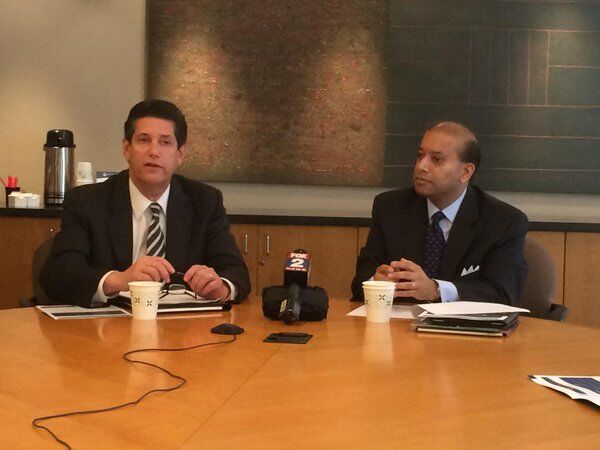
Sandy Baruah sees growing consensus among stakeholders who
recognize that neighborhood growth and development must be at
the heart
of strategies surrounding Detroit’s resurgence.
A United Voice: 2015 Mackinac Policy Conference is driving heightened collaboration and focus on Detroit’s neighborhoods
By TheHUB staff
It’s a Cinderella story in the making.
Once imperiled urban centers are now re-emerging as the hub of economic development efforts.
With every step forward, Michigan’s city centers are inching closer to becoming the centers of economic development they can, should and will be, says Sandy Baruah, president and CEO of the Detroit Regional Chamber, host to more than 1,500 of the state’s most powerful stakeholders attending the 2015 Mackinac Policy Conference.
Under Baruah’s leadership, the conference has become an important conscience and catalyst for collaborative development efforts, particularly urban renewal initiatives. It is these efforts the Chamber’s leadership and community stakeholders do not wish to see derailed, but readily admit, very well could be.
That’s why this year’s conference will close with an unprecedented panel discussion on what organizers hope to be an honest and open dialogue regarding race and class divisions.
Ultimately, the Chamber hopes to align conference participants around dialogue that will help ensure what happened in Detroit in 1967 will never happen here (or anywhere) again.
“If we don’t talk about it, it might get ahead of us, and we can’t afford that,” says Mark Davidoff, Michigan managing partner of Deloitte LLP and this year’s conference chairman.
If you look at the root causes of civil unrest, economic access is almost always at issue, according to a conference spokesperson.
That’s why the conference agenda is steeped with sessions on jobs, economic opportunity and access.
“We have more than 70,000 open jobs to fill in Michigan,” Baruah says. “Many of our employers, ready to hire skilled tradesmen, can’t find them. We don’t have enough graduates focused on STEM (Science, Technology, Engineering and Math). And many of those candidates are getting recruited outstate.”
In the past, most Chamber organizations would never venture into neighborhoods or address local economic development efforts.
“You just don’t hear those kinds of comments these days,” Baruah says. “There is a growing understanding among stakeholders throughout our state that our cities represent an integral part of our overall economy. And, increasingly, there’s real alignment around the understanding that neighborhood growth and development must be a part of our conversations.”
This level of understanding has helped spur unprecedented collaboration among the most unlikely of partners, says the Chamber head, who is a proponent of fact-based strategies that take into account the unique characteristics of communities served.
The Mackinac conference, now in its 35th year, has three key themes or conference pillars this year. They are talent, with a special emphasis on skilled trades, urban revitalization trends and cohesion centered around more regional thinking and collaboration on policy topics that creates “One Michigan Voice.”
Conference organizers hope to inspire a commitment from participants to speak with that one voice about important issues. That is the way Michigan’s best interests can be elevated by the power of maintaining one unified voice around important issues.
The effort will require honest, sincere dialogue.
“We’ve got to remain open to the idea that the best ideas may not be our own,” says Baruah.
That, according to Baruah, is what is needed more off the island and here at home.
Editor’s Note: The Detroit Regional Chamber and Bridges Communications Group, Inc, publisher of TheHUBwill be partnering on small business and neighborhood development issues in upcoming issues of TheHUB, which is distributed statewide to 90,000 city residents.


